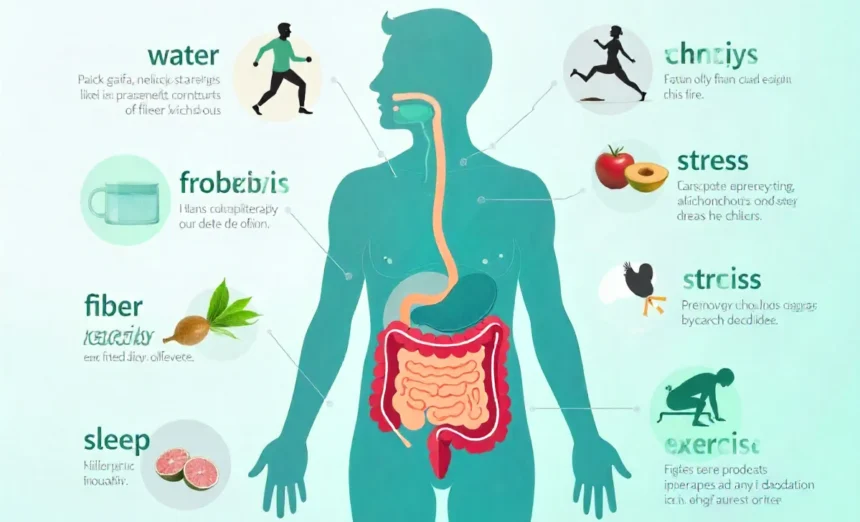Your gut health affects much more than digestion. The trillions of bacteria in your gut microbiome influence your immune system, mood, and overall well-being. Simple daily diet and habit changes can transform how you feel and support your body’s natural healing processes through better digestive wellness.
What Is Digestive Health and Why Does It Matter?
Digestive health refers to the balance of good bacteria in your digestive system. These beneficial gut bacteria work together to break down food, protect against harmful germs, and support your immune system. When this balance is disrupted, you may experience digestive issues, fatigue, or mood changes.
Your gut contains more bacteria than cells in your entire body. These microorganisms form what scientists call the microbiota diversity, which acts like a second brain. Research shows that gut bacteria communicate directly with your brain through the gut-brain axis, affecting everything from anxiety levels to food cravings.
A healthy gut lining acts as a barrier, letting nutrients pass through while keeping toxins out. When this barrier becomes damaged, it can lead to inflammation throughout your body. This connection explains why digestive problems often accompany other health issues, such as skin problems, joint pain, or frequent colds.
According to recent studies from the National Institutes of Health (NIH), digestive issues affect up to 70 million Americans each year, significantly impacting their quality of life. Many people don’t realize that simple dietary changes can dramatically improve their digestive comfort and overall health within just a few weeks.
What Does Good Digestive Wellness Mean for Daily Life?
Optimal digestive wellness means your body can efficiently break down food and absorb nutrients without discomfort. You should experience regular bowel movements, minimal bloating, and stable energy levels throughout the day. A balanced gut microbiome also means fewer digestive upsets when you encounter new foods or experience stress.
When your gut bacteria are thriving, they produce short-chain fatty acids that fuel your intestinal cells and reduce inflammation. This process supports faster healing of the gut lining and improves your body’s ability to fight off infections naturally.
Best Foods to Support Gut Health
High fiber foods serve as the foundation of excellent gut health by feeding beneficial bacteria and promoting healthy digestion. Vegetables like broccoli, Brussels sprouts, and leafy greens such as spinach and kale provide both soluble and insoluble dietary fiber that keep your digestive system moving smoothly. Fruits such as apples, pears, and berries offer natural prebiotics along with essential vitamins and antioxidants.
Whole grains like oats, quinoa, and brown rice deliver sustained energy while supporting healthy bacteria growth in your intestines. Legumes, including black beans, lentils, and chickpeas, pack impressive amounts of fiber and plant-based protein that nourish both your body and your microbiome.
Fermented foods introduce live probiotics directly into your digestive system, helping restore bacterial balance naturally. Yogurt with live cultures, kefir, kimchi, and sauerkraut contain millions of beneficial bacteria that can colonize your gut and crowd out harmful microorganisms. These foods have been supporting human digestive health for thousands of years across different cultures.
Dr. Gerard Mullin from Johns Hopkins Medicine explains that “a balanced diet rich in fruits and vegetables provides the fiber that builds good bacteria and digestive wellness.” Including a variety of colorful plant foods ensures you get diverse nutrients that support different types of beneficial bacteria, including Bifidobacteria and Lactobacillus strains.
Start your day with yogurt topped with berries and ground flaxseed, or add a serving of fermented vegetables to your lunch. Even small amounts of probiotic foods like kombucha can make a meaningful difference when consumed regularly over time.
Which High Fiber Foods Improve Your Gut-Friendly Diet?
The most effective high fiber foods for supporting a gut-friendly diet include raspberries with 8 grams per cup, avocados providing 10 grams per fruit, and chia seeds offering 12 grams per ounce. These foods not only feed good bacteria but also help maintain steady blood sugar levels and promote feelings of fullness.
Artichokes, split peas, and navy beans rank among the highest fiber foods available, delivering 10-15 grams per serving. Resistant starch foods like cooked and cooled potatoes, green bananas, and oats provide additional fuel for beneficial bacteria while supporting stable blood sugar levels.
Daily Habits to Improve Gut Health
Consistent daily habits create the foundation for lasting gut health improvements, often showing results within just two to four weeks. Hydration for digestion helps fiber work effectively in your digestive system and prevents constipation. Aim for eight glasses of water daily, and increase this amount if you’re adding more fiber to your diet.
Exercise for digestive health stimulates healthy digestion by encouraging food to move through your intestines at an optimal pace. Even a 10-minute walk after meals can significantly improve digestive comfort and reduce bloating. Exercise also helps manage stress hormones that can disrupt your gut bacteria balance.
Eating meals at consistent times helps regulate your body’s natural circadian rhythm and digestion patterns, supporting healthy bacteria growth cycles. Try to eat your largest meal earlier in the day when your digestive fire is strongest, and avoid heavy meals within three hours of bedtime.
Mindful eating habits like chewing thoroughly and eating without distractions allow your body to properly signal fullness and optimize nutrient absorption. Taking time to appreciate your food also activates your parasympathetic nervous system, which improves digestion and reduces stress-related gut inflammation.
Stress management for gut health through techniques like deep breathing, meditation, or gentle yoga directly benefits your digestive wellness by reducing cortisol levels. Chronic stress can alter gut bacteria composition and increase intestinal permeability, leading to digestive discomfort and inflammation throughout your body.
Quality sleep supports digestive wellness by allowing your microbiome to reset and repair overnight, with most beneficial bacterial growth occurring during deep sleep phases.
How to Build Gut-Friendly Habits Into Daily Life?
Start by choosing one habit to focus on for two weeks before adding another change to your routine. This approach prevents overwhelming your system and makes lasting changes more likely than trying to overhaul everything at once.
Set reminders on your phone to drink water regularly, or keep a water bottle visible on your desk throughout the workday. Creating environmental cues makes healthy habits feel automatic rather than requiring constant willpower and decision-making energy.
Understanding Probiotics and Prebiotics
Probiotics are live beneficial bacteria that you can consume through foods or supplements to support your gut microbiome. These helpful organisms work by colonizing your intestines, competing with harmful bacteria for resources, and producing compounds that support digestive health. Common probiotic strains include Lactobacillus and Bifidobacterium, each offering unique benefits for immune function and digestion.
Prebiotics are special types of fiber that feed your existing good bacteria, helping them multiply and thrive in your digestive system. Unlike probiotics, prebiotics aren’t living organisms but rather fuel sources that encourage healthy bacterial growth. Foods rich in prebiotics include garlic, onions, asparagus, and bananas.
Together, probiotics and prebiotics create a synergistic effect called synbiotics, where the living bacteria and their preferred food sources work together for maximum benefit. This partnership helps establish a diverse, resilient gut microbiome that can better withstand stress, dietary changes, and environmental challenges.
Many people think expensive probiotic supplements are necessary for digestive wellness, but research from the American Gut Project shows that fermented foods often provide more diverse strains and better survival rates. The live cultures in foods like kefir and miso have already proven they can survive in acidic environments and colonize your gut effectively.
What Are the Best Probiotics for Digestive Wellness?
Natural food sources typically provide more effective probiotics than supplements because the bacteria are already adapted to surviving in harsh conditions. Kefir contains up to 61 different probiotic strains, making it one of the most diverse sources available for supporting comprehensive digestive wellness.
Look for yogurt labeled with “live and active cultures” and avoid varieties with excessive added sugars that can feed harmful bacteria instead of beneficial ones.
The Impact of Diet Choices on Your Microbiome
Following an anti-inflammatory diet rich in polyphenol-rich foods like berries, green tea, and dark chocolate helps reduce gut inflammation while feeding beneficial bacteria. Research published by Harvard Health shows that these compounds act as prebiotics, supporting the growth of healthy microbes while inhibiting harmful bacterial overgrowth.
The Mediterranean diet pattern, emphasizing whole foods, healthy fats, and minimal processing, has been extensively studied for its positive effects on gut health. This eating approach naturally includes many gut-supporting foods while limiting inflammatory processed options.
Unfortunately, the modern Western diet, high in sugar and processed food, creates significant gut imbalance by feeding harmful bacteria and yeast while starving beneficial microbes. The processed food’s impact on microbiome diversity can be seen within just 24-48 hours of dietary changes, highlighting how quickly our food choices affect our internal ecosystem.
Dr. Robert H. Shmerling from Harvard Health notes that “fiber serves as a prebiotic, or food for the good bacteria that live in your gut” and recommends 21 to 38 grams daily. Unfortunately, Americans typically consume only 40-50% of their recommended fiber intake, contributing to widespread digestive issues.
Common Digestive Health Myths and Facts
Many people believe that bananas cause excess mucus production, but nutrition experts have thoroughly debunked this myth through clinical research. Bananas support digestive wellness by providing prebiotic fiber and potassium that help maintain healthy digestive muscle function. This misconception likely arose from traditional medicine practices that don’t align with modern nutritional science.
The carnivore diet trend claims that eliminating all plant foods improves digestive health, yet research consistently shows that dietary diversity supports a more resilient microbiome. Plants provide essential fibers and compounds that beneficial bacteria need to thrive, and removing them entirely can lead to reduced bacterial diversity over time.
Another common myth suggests that you need expensive probiotic supplements to maintain good digestive wellness, when in reality, fermented foods provide more diverse strains at a fraction of the cost. Traditional cultures have maintained excellent digestive health for millennia using fermented foods without any commercial supplements or specialized products.
Some people think that digestive issues are just a normal part of aging, but healthy gut bacteria can be maintained throughout life with proper nutrition and lifestyle choices. While some changes occur naturally with age, most digestive problems stem from dietary patterns and can be improved significantly with targeted interventions.
The belief that all bacteria are harmful has led many people to use antibacterial products excessively, which can disrupt beneficial microbes along with harmful ones. Your body needs diverse bacterial communities to function optimally, and overly sterile environments may weaken your immune system over time.
For those with specific digestive sensitivities, approaches like the FODMAP diet can help identify trigger foods while supporting gut healing, though this should be done under professional guidance from institutions like the Mayo Clinic.
Conclusion
Supporting your gut health doesn’t require dramatic lifestyle changes or expensive supplements – it starts with simple, consistent choices that nourish your beneficial bacteria. Focus on including more high fiber foods like vegetables, fruits, and whole grains in your daily meals while adding fermented foods to introduce helpful probiotics naturally.
Remember that small changes compound over time to create significant improvements in how you feel. Start by choosing one or two strategies from this article and commit to them for two weeks before adding more changes. Your gut bacteria respond quickly to positive changes, often showing improvements within just a few days of better nutrition.
Stay hydrated, manage stress, and listen to your body’s signals about which foods make you feel energized versus sluggish. Building gut-friendly habits into your daily routine creates lasting benefits that extend far beyond digestion to support your immune system, mood, and overall vitality.



